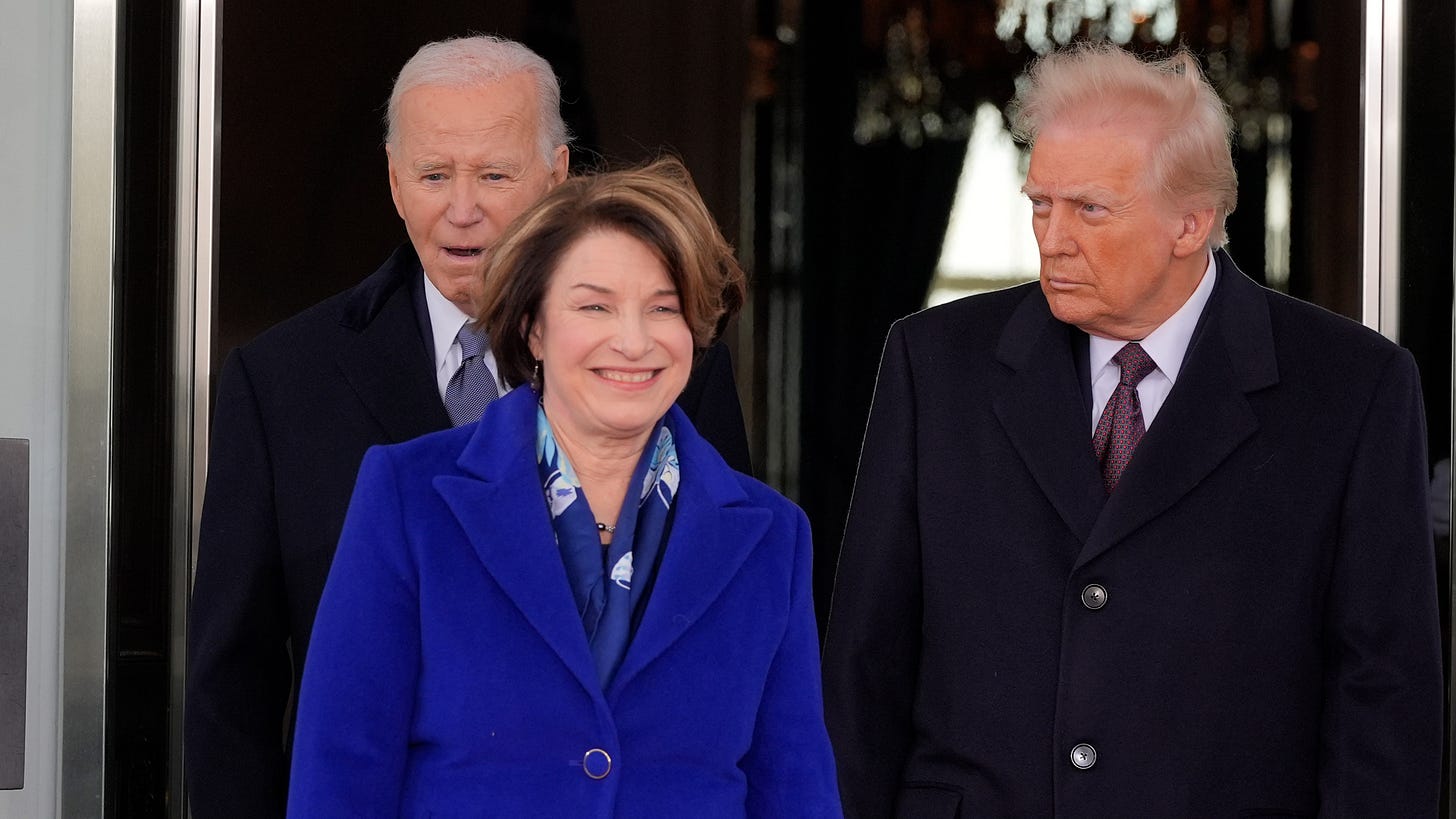Why Democrats Slept
Some thoughts on election narratives and Democratic Party quiescence in the face of a democratic crisis
I and others have been writing through the weekend about several massive attacks on American democracy and the rule of law currently being perpetrated by Donald Trump and Elon Musk, as well as the rather remarkable silence from the opposition Democrats. I want to describe what I think is going through the heads of Democratic leaders right now.
To be clear, I’m not saying all Democrats have surrendered. At the very least, Alexandria Ocasio-Cortez, Jamie Raskin, and J.B. Pritzker seem to recognize the level of threat that is going on right now. A lot of others, though, have been rather silent throughout the weekend. Amy Klobuchar spoke of finding “common ground” with the Trump administration, while Chuck Schumer issued a fusillade of whines about prices going up on pizza and guacamole (see below). It’s hard to describe this as meeting the moment. As Nicole Hemmer aptly wrote, a constitutional crisis requires “friction” if people are going to pay attention to it and push back, and Democrats are just not providing that.
What’s going on here? To be clear, I haven’t spoken to Chuck Schumer or Amy Klobuchar to ask them about this, but I have my suspicions that what’s driving this is related to narratives about the 2024 election.
Democrats, as they often do after an election loss, looked for narratives and scapegoats to explain what happened and figure out a path forward. When compared with 2016, relatively few Democrats blamed the presidential nominee specifically for the loss, although quite a few expressed concern that her sex and race hurt her. But more generally, Democrats saw the overall environment as a real challenge to them, with many Americans worried about “pocketbook issues” like the lingering effects of inflation, reduced purchasing power, housing costs, etc.
Plus, quite a few Democrats are fearful that they are too associated with advancing the interests of unpopular minorities. Right now, that’s largely transgender people and immigrants. In other election cycles, that means gays and lesbians, or Black people, or women, or someone else. Yes, the party overall wants to see inclusiveness and progress, but many of its more moderate members worry that too much visible progress along these lines scares centrist white voters off. Hence concerns about “identity politics” in many cycles.
One of the more egregious assertions of power Trump tried at the end of last week was force government agency websites to strip references and data collections pertaining to transgender people and any mentions of diversity, inclusiveness, and equity (DEI) efforts. This is an attempt to undermine decades of slow but important progress on inclusion at the government level.
If you believe that your party lost an election because it was seen as too supportive of unpopular minority groups and not attentive enough to economic issues, you would be doing exactly what Chuck Schumer spent this weekend doing.
Beyond being incredibly cynical, I think this is a very wrong read of both last year’s electorate and this year’s political situation.
For one thing, yes, economic issues were important in the election. Rightly or wrongly, many voters — particularly the sort of low-information centrist voters who tend to tune in shortly before elections and swing results one way or another — believed that the economy was in poor shape and their purchasing power was shrinking. Almost invariably, such people blame the incumbent party for that. They were angry at Joe Biden for it, and that extended to his vice president.
But to say that the problem was that Kamala Harris and Democrats didn’t focus enough on pocketbook issues is simply wrong. Harris proposed expanding the child care tax credit, mortgage assistance for homebuyers, a ban on price gouging, and more. She emphasized her middle class upbringing throughout the convention. It was definitely a key issue. But she was attached to the party that was getting the blame for the economic situation, and no amount of messaging or campaign promises could change that.
Importantly, a lot of the low-information voters who did show up to support Trump on this issue last year are, by definition, kind of tuned out from national politics now. There’s no election coming up and they have other things to focus on. They’re definitely not reading Chuck Schumer’s tweets. Will they notice that guacamole and pizza are more expensive when they shop for their Super Bowl party next weekend? Possibly. Will they get angry at Trump for it? Maybe. But so what? Maybe that whittles Trump’s approval rating down a point or two. But that doesn’t remotely affect the current crisis, in which unpopular groups are being erased from the government and a Nazi-sympathizing centi-billionaire with no government job or security clearance is impounding government payments and gaining access to private data.
It is quite plausible we’ll see more organized and aggressive activity from Democrats as this week unfolds. But so far, much of the response looks like an inadequate reading of 2024 with an eye toward being competitive in 2026, when the crisis is acute at the beginning of 2025.
Note: The title of this post is a reference to Why England Slept, the thesis and book John F. Kennedy “wrote” as a Harvard student about the appeasement of Nazi Germany.







there is NO common ground with fascism. nor with a non-security checked multi billionaire and his tec squadron being given open access to 7 billion dollars federal treasury payment system. this data breach of personal and business security is illegal. call your State DA, your Senators and Congressperson ASAP. those payments are Not busk’s to steal.
Seth, please focus on the Trump crisis and what we all can do.
Even elected Democrats are challenged to keep up with the deliberate blitz of Maga Musk chaos and rolling coup.